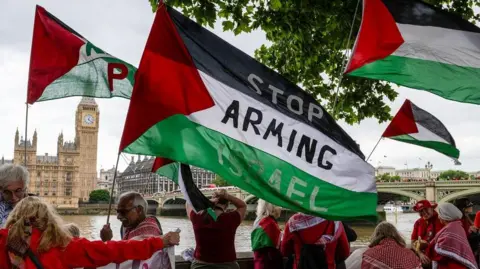### Calls for Stronger Action on Gaza by Keir Starmer
In recent developments, Sir Keir Starmer, leader of the UK Labour Party, is facing mounting pressure from within his party to take a firmer stance against Israel concerning the ongoing violence in Gaza. The humanitarian crisis has escalated, leading many MPs, including those from Labour’s left-wing factions, to demand immediate action amid allegations of atrocities being committed in Gaza.
During a session of Prime Minister’s Questions, Starmer described the circumstances in Gaza as “appalling and intolerable,” emphasizing the need for a ceasefire. While he pledged consideration of further actions against Israel, including potential sanctions, his statements have not sufficiently appeased critics from the opposition or even his own party members who are advocating for more decisive measures against Prime Minister Benjamin Netanyahu’s government.
Accusations of genocide have been levied against Israel due to the severe humanitarian impact of its military actions in Gaza. Starmer’s comments come as airstrikes continue, contributing to the profound distress of civilians, a situation exacerbated by recent closures of aid distribution centers, which the Israeli military has insisted will be treated as combat zones. Reports from the Hamas-run Civil Defence Agency indicate that at least 27 Palestinians were killed near these aid centers during clashes with Israeli forces.
Labour’s backbench MPs expressed discontent with the government’s approach, as many wore red “stop arming Israel” badges during the parliamentary debate. Middle East Minister Hamish Falconer faced criticism for the deaths and called for accountability, stating, “We call for an immediate and independent investigation into these events for the perpetrators to be held to account.” His assertion that “Israel’s unjustified block on aid into Gaza needs to end” reflects the growing international demands for humanitarian access.
### Demands for Sanctions and Recognition of Palestine
Specific calls for accountability have intensified, notably from Labour MP Rosena Allin-Khan, who demanded sanctions against those she described as “murderous figures” responsible for the violence in Gaza. She expressed frustration with verbal statements, insisting on concrete action from the UK government. Furthermore, other MPs echoed sentiments suggesting that history would not look kindly on the government’s inaction during this crisis. Labour MP Paula Barker notably described the situation as a deliberate policy of annexation and genocide, further pressuring Starmer to take a stand.
Falconer’s responses to these passionate pleas have been circumspect, referring to the complexities surrounding such allegations as matters for competent courts to determine. He acknowledged the MPs’ frustrations but maintained that the UK government would pursue a diplomatic route with Israel before resorting to more stringent measures. This reluctance to act immediately has drawn ire from within his party and from the general public, especially as the conflict heightens, resulting in significant casualties.
The UK government is also facing calls to officially recognize the state of Palestine. Former Attorney General Sir Jeremy Wright highlighted a shift in his perspective, which now favors recognizing Palestine due to the Israeli government’s rhetoric and actions.
### Protests and Political Pressure
Outside the halls of Parliament, protests were in full force, with demonstrators urging an end to arms sales to Israel. Former Labour leader Jeremy Corbyn advocated for a public inquiry into the UK’s arms sales to Israel and its role in the violence, claiming it is imperative to uncover the historical context and complicity in humanitarian violations. Corbyn’s proposed draft bill aims to examine all aspects of UK cooperation with Israel, proposing serious inquiries into the government’s actions.
The debate on these issues is heated and reflects a broader societal concern over the UK’s foreign policy decisions. As the humanitarian crisis deepens, calls for more significant actions resonate louder in Parliament and among constituents.
Political parties, including the Liberal Democrats, have joined the chorus requesting the government to adopt a stronger position. Leadership figures are urging Prime Minister Starmer to push for humanitarian corridors to facilitate vital aid into Gaza, further emphasizing the urgency of the crisis.
In summary, the current situation within the Labour Party and the broader UK political landscape regarding the Gaza conflict reveals a complex interplay between activism, political obligation, and the urgent need for humanitarian responses amidst escalating violence. With casualties in the tens of thousands and voices calling for accountability growing more urgent, the UK government’s approach under Starmer will increasingly form a pivotal point in the unfolding narrative of international relations surrounding the Israel-Palestine conflict.



